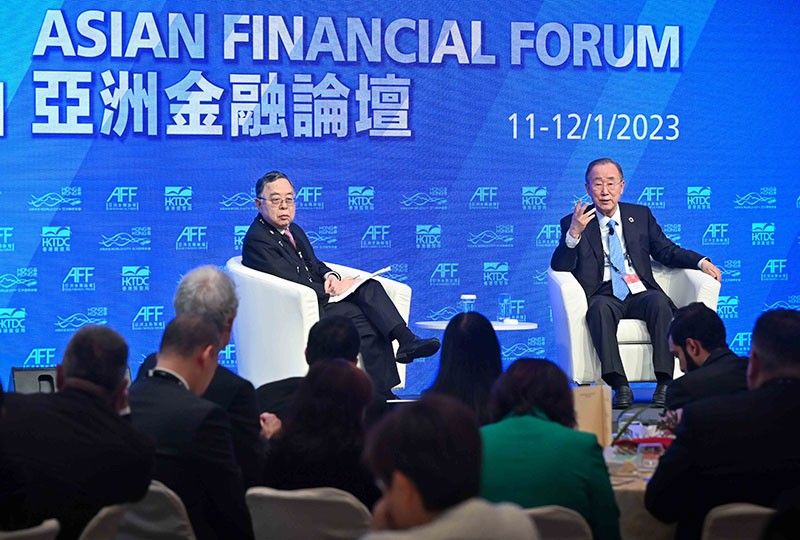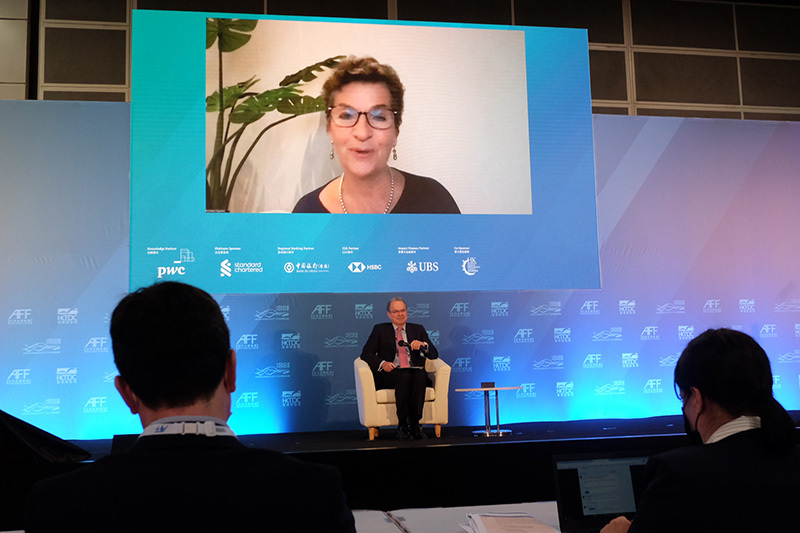Sustainability, decarbonization take center stage at Hong Kong’s Asian Financial Forum

HONG KONG — Returning physically at the Hong Kong Convention and Exhibition Center for the first time in almost three years since the pandemic, the 16th Asian Financial Forum (AFF) last January 11 and 12 tackled anew environmental and social threats the planet is facing, and how the global finance sector can help address these by moving toward a net zero future.
Apart from over 100 global business leaders, financial experts, entrepreneurs, tech giants and economists, the forum also invited key policymakers including former United Nations Secretary General Ban Ki-moon.
In his remarks on Day 1’s keynote luncheon, Ban warned, “We now stand on the precipice of a period great change. One that will have a profound implication on our planet, economies and societies.”
He underscored a “variety of converging crises and increasing uncertainty” including the climate crisis, the COVID-19 pandemic, the dispute between China and the US, and Russia’s war on Ukraine.
“We need global solutions to address the challenges we are facing now,” he said, adding, “I fully believe that helping achieve the UN Sustainable Development Goals (SDGs) can help bring us together in this era of expanding division.”
In 2015 under his leadership, the UN held a General Assembly to adopt the 2030 Sustainable Development Framework which includes 17 Sustainable Development Goals.
Ban also stressed the importance of mitigating the impacts of the climate crisis and pushing for greener growth. He called on financial leaders to support nations in their commitments to cut emissions and decarbonize global economies.

Christiana Figueres, who has worked with Ban in the UN until 2016 as former executive secretary for the Convention on Climate Change, stressed how commitments should be implemented.
She participated virtually in a keynote session on AFF Day 2 where she identified an implementation gap.
“The World Benchmarking Alliance recently assessed 400 banks, asset owners, asset managers and insurance around the world, just to see how serious they were about their contribution to not just climate but to sustainable economy,” she said.
Only 20% of financial institutions publicly acknowledge their impacts on people and climate, and only 5% has put in place frameworks to address these impacts. It shouldn’t stop there, she said, as actual hard work has to be done beyond all the good intentions.
Becoming a sustainable finance hub
The second day of AFF presented how Hong Kong is transitioning to become not just a leading international finance hub, but also a sustainable one, for markets from Mainland China, across Asia and the rest of the world.
“As an international financial center with a very vibrant capital market that sees active participation of both local and international investors, it is also very befitting for the green finance discourse to take place in Hong Kong,” said Permanent Secretary for Financial Services and the Treasury (Financial Services) Salina Yan during the panel discussion "Scaling Transition Finance & Carbon Markets towards A Net Zero Future.”

According to Yan, Hong Kong is now poised to offer transition finance that provides financial services to companies involved in high-carbon emitting industries such as coal-fired power generation, aviation, chemical and even paper-making, among many others.
“We walk our talk. Just last week, we issued a total of $5.75 billion green bonds denominated in Renminbi, euro and US dollars with tenors ranging from two to 32 years. The offering is the largest sustainable bond issuance in Asia so far. We are also the first Asian government issuing green bonds in triple currencies concurrently,” she continued.
Furthermore, Hong Kong has set up a Green and Sustainable Finance Cross-Agency Steering Group that will examine policy and regulatory issues in green and sustainable finance.
The region will also focus on capacity building by providing career and opportunities to financial services ESG professionals.
Decarbonization toward net zero
As part of the many policies and plans Hong Kong is undertaking toward a net zero future, it is now also able to lead in carbon trading.
Yan discussed Hong Kong’s development into a global, high-quality voluntary carbon market. Just last October, the Hong Kong Exchanges and Clearing Limited was able to inaugurate an international carbon marketplace in Hong Kong, called Core Climate.
“Core Climate seeks to connect capital with climate-related products and opportunities in Hong Kong, Mainland China, Asia and beyond. It is currently the only carbon marketplace that offers HKD and RMB settlement for the trading of international voluntary carbon credits,” Yan shared, adding that in less than a month, the platform already recorded over 40 trades, equivalent to around 400,000 tons of carbon credits.
In a report, McKinsey explains that trading carbon credits can help companies and the world achieve net-zero goals. It estimates that “demand for carbon credits could increase by a factor of 15 or more by 2030 and by a factor of up to 100 by 2050.”
Voluntary carbon credits (purchased not for compliance purposes) then directs green financing for climate-related projects that can help address “biodiversity protection, pollution prevention, public-health improvements and job creation,” the McKinsey report adds.

Putting more focus on carbon markets, the AFF held another panel discussion that scrutinized the value of carbon credits and their integrity.
It featured speakers from Asia-based carbon exchange companies that develop technologies or provide digital solutions such as blockchain to help measure, reduce and offset carbon emissions.
“What is a carbon credit? It’s an instrument. But while you get to make a claim, using that instrument, for example, you can claim that you’re net zero or you can claim that you’re carbon neutral, the benefits don’t accrue to you. It actually accrues to the environment,” Hum Wei Mei, head of Asia Pacific at AirCarbon Exchange.
Max Song, founder of Carbonbase, underscored the importance of carbon exchanges in the context of climate crisis. “Because over the last 200 years of industrialization and civilization, we have actually used few billion years of stored energy from fossil fuels and now we are starting to see the cost.”
He thus looks at carbon not in a negative way but in a positive light by transforming it into a social incentive structure.
“How do we mobilize 7.8 billion people around the world to actively care about climate change? We use financial incentives and carbon is one of the most powerful, global, fluid financial incentives,” Song added.
- Latest






























